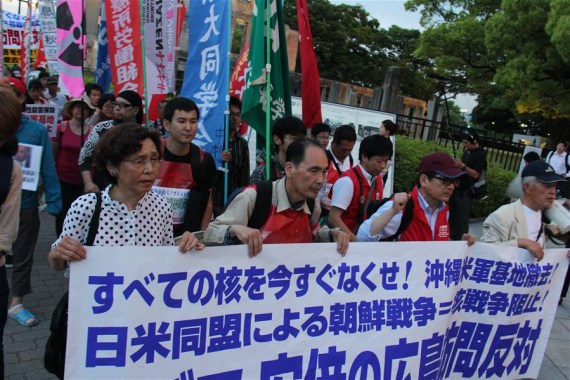
People take part in a protest against the visit by U.S. President Barack Obama, near the Hiroshima Peace Memorial Park in Hiroshima, Japan, May 26, 2016. (Photo: Xinhua/Shen Honghui)
Dozens of Japanese citizens gathered in Hiroshima on Thursday, protesting U.S. President Barack Obama's visit to Hiroshima and the two countries' intended political manipulation of the city.
The protesters held banners that read: "Get rid of all nukes immediately", "Remove all U.S. bases from Okinawa" and "We won't let you use military alliances to start your next war" and shouted: "You're not welcome here, Obama and Abe" and "Get out of Hiroshima" in the
Hiroshima Peace Memorial Park.
The protesters included labor union members, college students as well as survivors and relatives of victims of the atomic bombing of Hiroshima in 1945.
"Hiroshima used to be a military city and was ruined by an atomic bomb during the war. Japanese Prime Minister Shinzo Abe is a historical revisionist and always tries to justify the war of aggression. The Japanese government is portraying Japan as a victim country through Obama's Hiroshima visit and diminishing the facts of Japan's invasion in the past," Hiroshima student Morita Hirotaka told Xinhua.
Hirotaka added that with the end of his last term in office approaching, President Obama hoped to leave behind some political legacy. "It is unbearable that both Abe and Obama are making political use of Hiroshima," said Hirotaka.
The Abe Cabinet issued a statement this April saying that the Constitution does not necessarily ban Japan from possessing and using nuclear weapons even though domestic and international laws limit the use of nuclear weapons. Hirotaka said this went totally against Abe and Obama's push for a nuclear free world.
Nagasaki resident Hashizato Kougo said the Nagasaki survivors of the atomic bomb might become involved in war again as the Abe administration has not reflected on the war of aggression and passed the recent war legislation.
Japan's new controversial security laws came into effect on March 6, months after being enacted following the forced passage of related bills through both chambers of parliament.
The new laws, marking Japan's biggest legislative post-war security shift and reversing seven decades of pacifism, will permit Japanese forces to engage in combat missions overseas in a move that has drawn the ire of Japan's neighbors and the international community for threatening to destabilize security and peace in the Asia-Pacific region.
"We, as residents of Nagasaki, are strongly opposed to such a government led by Abe which is abandoning Japan's postwar constitution and putting on a political show using Hiroshima," said Kougo.
Okinawa University student Akamine Chiaki told Xinhua that criminal cases involving U.S. soldiers repeatedly happened in Okinawa. Chiaki said the anger of the Okinawa people has reached a new peak.
On Wednesday, more than 4,000 Japanese rallied around the U.S. Kadena Air Base in Japan's southernmost prefecture of Okinawa against the murder of a local woman by an ex-U.S. Marine Corps. member.
Obama extended "sincerest condolences and deepest regrets" over the murder late Wednesday at a meeting with Abe ahead of the G7 summit. He said the murder was a "tragedy" and considered "inexcusable", and pledged to continue to cooperate fully with the investigation to ensure that justice is done under the Japanese justice system.
Chiaki said as the meeting between the two leaders didn't reach any practical solutions and was only aimed at minimizing the side effects of the case, he came to Hiroshima to protest against Obama's visit.
Obama is planning to visit Hiroshima on Friday accompanied by Abe, marking the first sitting U.S. president to visit the city that was obliterated by a U.S. atomic bomb at the end of World War II.
The United States dropped an atomic bomb over Hiroshima, a stronghold of Japanese Imperial Army and weapons arsenal in 1945, so as to accelerate the end of WWII which was partially waged by Japan.
The Japanese government frequently uses Hiroshima to pose itself as a victim of the war but seldom mentions its own wartime atrocities in its invasions against its Asian neighbors.


















































